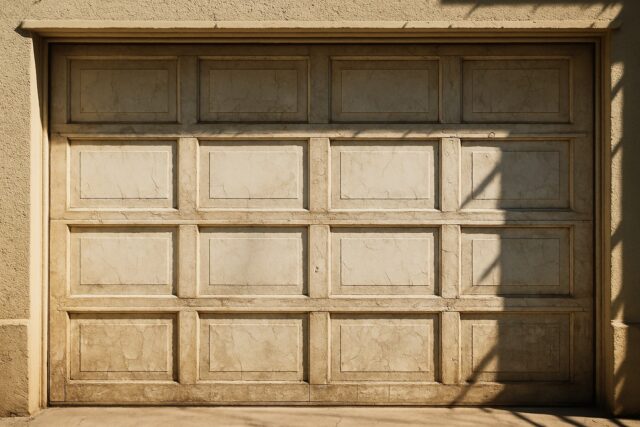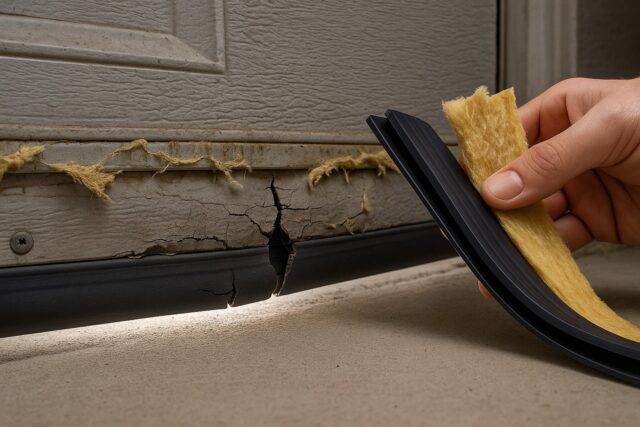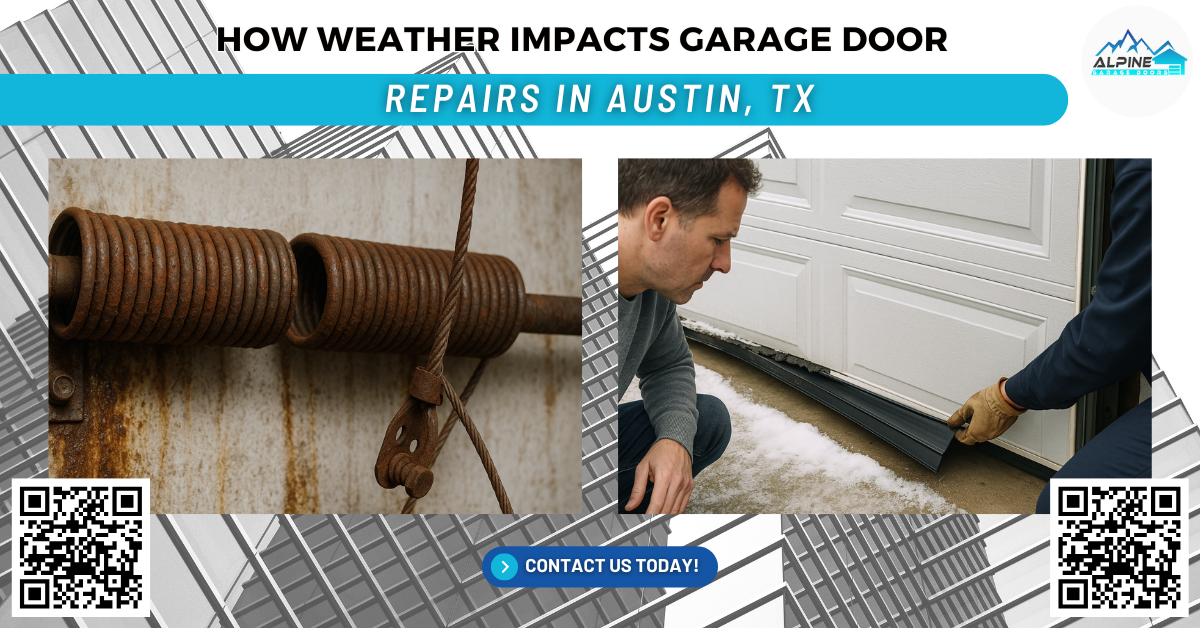Weather Woes: A Real Austin Story
During a particularly cold winter morning in Austin, a homeowner in the Barton Hills neighborhood contacted Alpine Garage Doors Texas with an urgent concern. Their garage door was completely stuck and would not open, even with manual effort. Upon arrival, our technicians discovered multiple weather-related complications. Cold temperatures had caused the steel components to contract, the rubber seal at the bottom of the door had hardened and cracked, and previous rainfall had resulted in water that had frozen solid in the tracks. Our repair team carefully replaced the damaged seal, adjusted the door’s alignment, and applied a weather-appropriate silicone lubricant to restore smooth operation. This case is just one of many that show how local weather conditions can quickly create complex garage door problems.
Local Climate and Garage Door Problems
Austin is known for its dynamic and unpredictable climate. It is not unusual for the area to experience intense heat waves, sudden downpours, strong wind gusts, and even brief freezes all within the same season. These rapid weather changes affect the materials and components of garage doors, including springs, cables, tracks, openers, and insulation. Regular wear is intensified by climate conditions, accelerating the need for professional garage door repairs and services. Without proactive attention, minor issues can evolve into major problems that require costly parts replacement or even full system overhauls.
A Daily Essential with Seasonal Vulnerabilities
Garage doors are among the most frequently used entry points for homes and businesses alike. They provide not only security and convenience but also insulation and energy efficiency. However, few people realize how vulnerable these systems are to seasonal weather fluctuations. For instance, what may seem like a minor squeaking noise today could indicate worn rollers that will soon fail due to heat expansion or cold contraction. Recognizing how weather impacts your garage door allows you to implement preventative maintenance strategies that save time, reduce repair costs, and preserve safety.
How Summer Heat in Austin Impacts Garage Door Repairs
Expansion of Metal Parts
Austin’s scorching summers cause the metal parts of a garage door system to expand. Springs, hinges, tracks, and even bolts are all subject to thermal expansion. This expansion can misalign the entire garage door track, creating additional stress on the opener and the cables. A misaligned track leads to uneven movement, loud grinding noises, and eventually a complete breakdown of the door’s operation. Over time, repeated expansion and contraction cycles can cause fatigue in steel components, leading to hairline fractures that may go unnoticed until a full break occurs.
Tip: To mitigate this, schedule a summer tune-up service that includes track alignment checks and thermal inspections using infrared tools to identify heat-stressed parts before they fail.
Fading Panels and Cracked Surfaces
Direct UV exposure from the sun not only fades paint and finish on garage door panels but also dries out materials like wood, fiberglass, and even certain plastics. In areas like Circle C Ranch and East Austin, where sun exposure is particularly high, homeowners report frequent issues with warped wood doors and cracked vinyl components. These cosmetic and structural problems reduce the energy efficiency of your garage and can result in water infiltration and pest infestations.

Tip: Consider applying a UV-resistant sealant annually to preserve the finish and strength of your garage door. For doors showing significant signs of sun damage, replacement with an insulated steel or composite door may be a better long-term solution.
Breakdown of Lubricants
Traditional petroleum-based lubricants can become ineffective in high heat, as they either thin out excessively or become sticky. This causes the door’s rollers and hinges to drag rather than glide, making the opener work harder and shortening its lifespan. Our experienced technicians recommend high-temperature silicone or lithium-based lubricants, especially for properties in hot zip codes like 78745 and 78749.
Tip: Reapply lubricant at the start and midpoint of summer to ensure consistent performance and avoid unnecessary garage door repairs.
How Cold Winters Affect Garage Door Performance
Metal Contraction and Stiff Operation
While Austin winters may not be severe, the dip in temperature still affects the mechanical components of your garage door. Metal contracts in the cold, causing springs to lose tension and tracks to tighten. As a result, the garage door may feel heavier, move more slowly, or jerk unexpectedly during operation. This added resistance can also cause the opener motor to overwork and burn out.
Real-life scenario: One homeowner in North Austin noticed their garage door made a loud popping sound every morning in January. Our technician discovered that the contraction of the torsion springs had caused misalignment with the center bracket. Re-tensioning the springs and reinforcing the bracket resolved the issue.
Weatherstripping and Seal Deterioration
Rubber components are particularly vulnerable in colder months. When exposed to freezing conditions, the bottom seal of the garage door hardens and eventually cracks. This allows cold air, water, and even pests to enter the garage. These gaps also reduce the thermal efficiency of your home, increasing energy costs.
Tip: Inspect the weather seal every November. If it feels hard or brittle to the touch, schedule a replacement before temperatures drop further.
Freezing Moisture and Jammed Rollers
Austin’s winter rain, when followed by an overnight freeze, can create ice buildup in tracks and around rollers. Frozen water expands and interferes with the door’s movement, often jamming it in place. Forcing the door open can damage the opener, break cables, or bend the track.
Tip: Ensure proper drainage around the garage entrance and use a de-icing agent on particularly cold nights. Avoid DIY forceful opening and call a technician if the door is stuck.
The Impact of Austin’s Humidity and Rainy Seasons
Rust Formation and Corrosion
Humidity levels in Austin can exceed 90 percent during peak months, especially from April through October. These conditions accelerate rust formation on metal garage door parts, including extension springs, hinges, and cables. Rusted springs are more likely to snap under pressure, and corroded cables may fray or break entirely, resulting in hazardous door issues.
Tip: Schedule biannual inspections to identify early signs of rust. Technicians can apply anti-corrosion treatments and recommend high-galvanized or stainless steel replacements when necessary.
Swollen Wood and Warped Panels
Wooden garage doors absorb moisture from humid air and rain, causing them to swell and press against the frame. This pressure creates resistance during opening and closing, which strains the opener motor and leads to uneven door alignment. Areas near Lake Travis and Westlake Hills report this issue more frequently due to higher moisture content in the air.
Tip: Re-seal wood doors with waterproofing agents every six months, and consider upgrading to insulated composite doors for higher humidity resistance.
Mold, Mildew, and Water Damage
Moisture trapped inside uninsulated garages fosters mold and mildew growth on the interior walls, insulation, and even on the garage door itself. This not only deteriorates materials but also poses respiratory health risks.
Tip: Ensure your garage is properly ventilated, install a vapor barrier if needed, and inspect for leaks around windows and corners. Include mold inspection as part of annual garage maintenance.
How Strong Winds and Storms Cause Garage Door Damage
Impact from Flying Debris
Strong storms and high winds in Austin often result in branches, lawn furniture, and other debris being thrown against garage doors. The result is usually dents, broken panels, or shattered windows. Damage to the surface can compromise the door’s structural integrity and impact how it moves along the tracks.
Tip: Install a storm brace system or upgrade to wind-rated garage doors. Keep your yard clear before storms to minimize the risk of impact damage.
Track Displacement and Opener Strain
High winds can apply direct force to the door panels, causing misalignment in the tracks or bending the brackets that hold them in place. This displacement affects how the door rolls and can lead to jerky or halted movement. An overstrained opener may burn out prematurely.
Tip: If your door moves unevenly after a storm, avoid using it and call for an inspection. Prompt adjustments can prevent long-term damage to the track and opener motor.
Electrical Damage to Openers
Lightning and power outages during storms can cause power surges that damage garage door openers. Circuit boards are particularly vulnerable, and a surge can wipe out your entire opener system.
Tip: Use a surge protector rated for garage door openers and have backup power solutions like battery systems installed for critical access during emergencies.
Seasonal Maintenance Tips for Austin Homeowners
Inspect and Adjust Twice a Year
Use spring and fall as reminders for professional garage door inspections. These seasons offer milder weather, making it ideal to check springs, safety sensors, bolts, rollers, and openers. Adjusting tension, realigning tracks, and replacing worn parts during inspections helps avoid emergency breakdowns in extreme weather.
Apply Weather-Appropriate Lubrication
Ensure that all moving parts, such as hinges, rollers, springs, and pulleys, are well-lubricated with products suitable for the current temperature. This small step greatly enhances smooth operation and extends the lifespan of your system.
Replace Old Seals and Insulation
Worn-out weather seals and cracked insulation materials can allow moisture, dust, and pests into your garage. Replacing these components improves energy efficiency and protects the structural integrity of your garage door.

Test Safety Systems Regularly
Garage door sensors and auto-reverse systems are essential for preventing injury and damage. Test them monthly using a block of wood or other object in the path of the closing door to ensure it reverses on contact.
Why Garage Doors in Austin Require Extra Care
Because Austin’s weather includes heatwaves, cold fronts, storms, humidity, and high winds, garage doors endure more stress than in many other regions. Each element impacts different parts of the system, from cables and rollers to the opener and remote control systems. Timely professional maintenance, part replacements, and weather-specific adjustments help homeowners avoid costly repairs and ensure safe, consistent operation throughout the year.
Common Weather-Related Garage Door Repairs in Austin
- Replacement of broken springs due to temperature-induced metal fatigue
- Realignment of warped or bent tracks after exposure to extreme heat or wind
- Repair of worn rollers, hinges, and pulleys damaged by moisture and friction
- Panel replacement caused by storm-related impacts or UV exposure
- Opener repair or replacement due to power surges or motor burnout
- Cable replacement following fraying or rusting during rainy seasons
- Restoration of seal integrity for better insulation and energy savings
Frequently Asked Questions (FAQs)
- Can a garage door opener stop working due to extreme temperatures?
Yes, extreme heat or cold can affect the performance of your garage door opener. High temperatures may cause the motor to overheat, while cold weather can slow down the internal gears or affect the battery in remote systems. - How often should I lubricate my garage door parts in Austin’s climate?
In Austin’s fluctuating weather, it’s best to lubricate garage door parts every 3 to 4 months. Use a weather-appropriate lubricant to protect against heat breakdown and moisture buildup. - Are insulated garage doors worth it for homes in Austin?
Absolutely. Insulated garage doors help regulate interior garage temperatures during both hot summers and cooler winters, offering better energy efficiency and noise reduction. - What signs indicate weather damage to my garage door that I should not ignore?
Look for rust on springs or cables, warping or swelling of panels, cracked weather seals, or loud, unusual noises during operation. These are early warning signs that weather-related damage may be affecting your garage door’s performance.
How Can Alpine Garage Doors Texas Help You?
At Alpine Garage Doors Texas, our team is equipped with the tools, training, and experience to address all weather-related garage door problems. We understand the unique climate challenges in Austin and tailor our services accordingly. From seasonal tune-up services to emergency garage door repairs, we are committed to maintaining the safety, functionality, and appearance of your garage doors.
Our expert technicians are available for prompt inspections, detailed diagnostics, and high-quality repairs using industry-leading parts. Whether your garage door has been damaged by heat, rain, wind, or sudden cold snaps, we provide reliable and affordable solutions tailored to your specific needs.
Reach out to Alpine Garage Doors Texas at 346-438-1138 or visit us at 638 Saddle Rock Dr, Houston, TX 77037. Our friendly customer support team is ready to help schedule your service and answer any questions. Trust our years of experience and dedication to deliver professional garage door service that exceeds expectations.
Final Thoughts
The weather has a powerful influence on the function, reliability, and safety of your garage door. The high heat of summer, the chill of winter, the moisture of Austin’s rainy seasons, and the force of local storms all take a toll on garage door systems. Homeowners and business owners alike must stay proactive by scheduling routine maintenance, investing in weather-resistant materials, and acting quickly when problems arise.
Choosing a trusted partner like Alpine Garage Doors Texas ensures that your door receives expert care and attention, no matter the season. We provide comprehensive garage door services, from emergency repairs to long-term maintenance plans, helping you achieve peace of mind and preserve the value of your home or commercial property.
Take control of your garage door’s performance today. Contact us now or schedule your inspection online to experience the Alpine difference. Your safety, comfort, and satisfaction are our top priorities.

